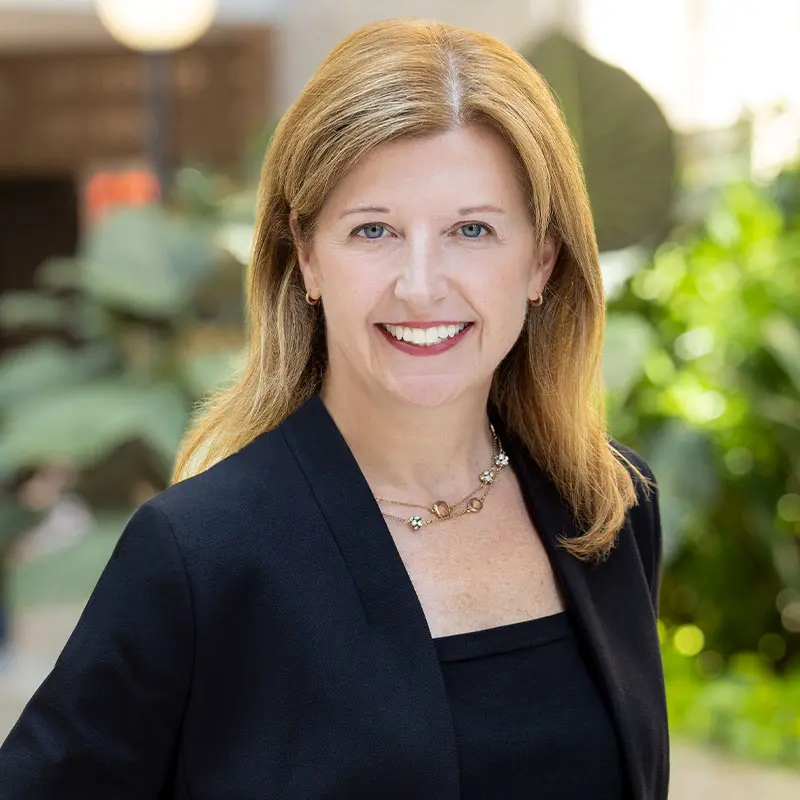As the number of people living with Alzheimer's disease and related dementias continues to rise nationwide, the impacts of this trend, both on this population and its ability to live in the community and on caregivers, remain understudied. The Brookdale Department of Geriatrics and Palliative Medicine at the Icahn School of Medicine at Mount Sinai is making progress in addressing that gap through research that is generating new insights on the challenges posed by this disease.
“Our studies demonstrate there is a mismatch in terms of the services provided to and the services needed for people with dementia. Furthermore, the patchwork quilt of paid and unpaid caregivers that exists may not be sustainable in terms of addressing the long-term care requirements of this group as they increasingly remain in the community through the end of life,” says Melissa Aldridge, PhD, MBA, Professor of Geriatrics and Palliative Medicine and Vice Chair for Research at the Brookdale Department. “From both a clinical and policy perspective, we need to think about a model of caregiving that is longer term, delivered in the home, and partners with existing family caregivers in a way that is more sustainable.”

Melissa Aldridge, PhD, MBA, Professor of Geriatrics and Palliative Medicine and Vice Chair for Research
The following recent studies by the Brookdale Department’s faculty highlight the needs that must be addressed for the benefit of both patients and their caregivers:
Family Caregiving for Those With and Without Dementia in the Last 10 Years of Life
In this study, a team of researchers led by Jennifer M. Reckrey, MD, Associate Professor of Geriatrics and Palliative Medicine, compared the number of family caregiver hours provided to individuals who have dementia versus those hours devoted to those without dementia during the last 10 years of life. They found that the dementia caregiver cohort provided three times as many hours of care as the non-dementia cohort.
Furthermore, care hours among the dementia cohort increased steadily in each of those years (mean annual increase 17 percent; range 18 percent to 41 percent), while the care hours remained low in the non-dementia cohort until the last year of life, when they tripled. Adult children of individuals with dementia provided a mean of 17 hours of care per week versus 10 hours among adult children in the non-dementia cohort. Equally concerning, existing programs such as paid family leave do not match the long-term progressive care needs of individuals with dementia. The findings were published in the Journal of the American Medical Association Internal Medicine in November 2020.
“This study highlights the high levels of caregiving provided to those with dementia by their family caregivers in general and by adult children in particular,” Dr. Reckrey says. “All married individuals relied primarily on spouses to provide care. However, adult children provided the bulk of care for family members with dementia, who were on average older and more likely to be widowed. Substantial caregiving responsibilities for this population often began at least 10 years before death.”

Jennifer M. Reckrey, MD, Associate Professor of Geriatrics and Palliative Medicine
Caring Together: Trajectories of Paid and Family Caregiving Support to Those Living in the Community With Dementia
A follow-on from the preceding study, department researchers, led by Dr. Reckrey, explored how family and paid caregivers work together to support patients with dementia and the factors that influence the shift toward paid caregiving at the end of life. They identified three trajectory groups: low/stable care, with low/no paid care and moderate family care; increasing paid care, with moderate paid and family care; and high family care, with increasing high family care and stable, low-paid care.
The researchers found that the trajectory toward increased paid care was not just determined by clinical need but also by socioeconomic factors, with the high family care group likely to be non-white and experience multiple medical comorbidities, depression, and social isolation. Ensuring equitable access to paid care may provide crucial support for people living with dementia and their family caregivers as care needs grow. The findings were published in The Journals of Gerontology: Series B in January 2022.
Home but Not Homebound: A Prospective Analysis of Persons Living With Dementia
In this study, a research team led by Dr. Reckrey explored predictors for becoming homebound among a national sample of Medicare beneficiaries with newly identified dementia. The researchers used the National Health & Aging Trends Study (NHATS) 2011-2018 to identify community-dwelling older adults at the time of diagnosis. They found that 20 percent of these individuals were homebound and were more functionally impaired, medically complex, and socioeconomically disadvantaged versus those who were non-homebound.
The researchers also found that factors such as depression (subhazard ratio [SHR] 2.19, 95 percent CI 1.36, 3.54), living in an assisted facility (SHR 2.60, 95 percent CI 1.35, 4.97), and Hispanic ethnicity (SHR 1.91, 95 percent CI 1.05, 3.47) were associated with becoming homebound. However, it may be possible to slow that progression to homebound status by addressing modifiable factors such as depression. The results were published in the Journal of the American Medical Directors Association in January 2022.
The Brookdale Department is building on these studies by evaluating interventions that could better support individuals with dementia living in the community. That focus is exemplified by a National Institutes of Health-funded multicenter trial of a home-based palliative care intervention for people with dementia. “Through these efforts, we can gain the necessary insights not just to improve outcomes among people with dementia or enable them to live in the residence of their choice but also address the financial and emotional health challenges faced by their caregivers,” Dr. Aldridge says.
Navigating Dementia: A Mount Sinai Community for Caregivers is a private Facebook group that helps members find guidance and support from peers and our dementia experts. Caregivers are invited to join this new community in sharing, asking, listening, and learning. They will find practical tips, treatment ideas, medical expertise, encouragement, ongoing discussions, and hope for the journey. Click here to see the group.
Late Breaking Research
Mount Sinai Researchers Awarded a $2.4 Million Grant From the CDC to Support Aging 9/11 Rescue and Recovery Workers
As the first responders to the attacks of September 11, 2001, grow older, Mount Sinai’s nationally lauded experts in aging have received a $2.4 million grant from the Centers for Disease Control and Prevention (CDC) to study how best to care for them into old age. The median age of these first responders is now 59, and by 2030, the majority of them will be 65 or older and at risk for aging-related conditions and consequences of the terrorist attacks. Mount Sinai has long been a leader in caring for this population through its World Trade Center (WTC) Health Program Clinical Center of Excellence.
“Because World Trade Center responders were exposed to high levels of toxicants and intense psychological trauma—hazards that can accelerate the aging process—during the emergency response and cleanup following the 2001 disaster, they are likely at increased risk for premature aging and associated age-related syndromes, such as functional decline and fall risk,” says Fred Ko, MD, Lead Principal Investigator and Associate Professor of Geriatrics and Palliative Medicine at Icahn Mount Sinai.
